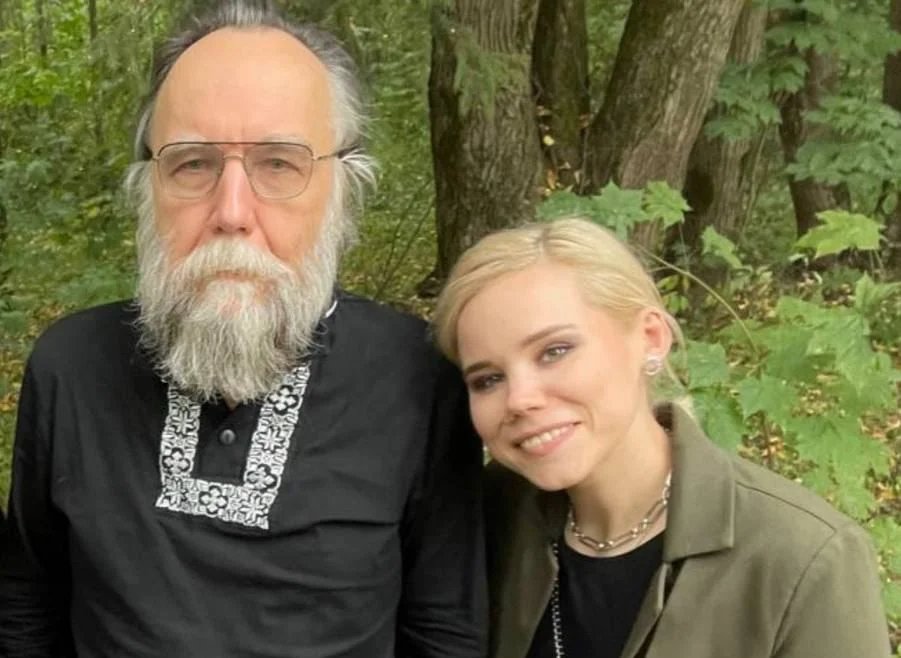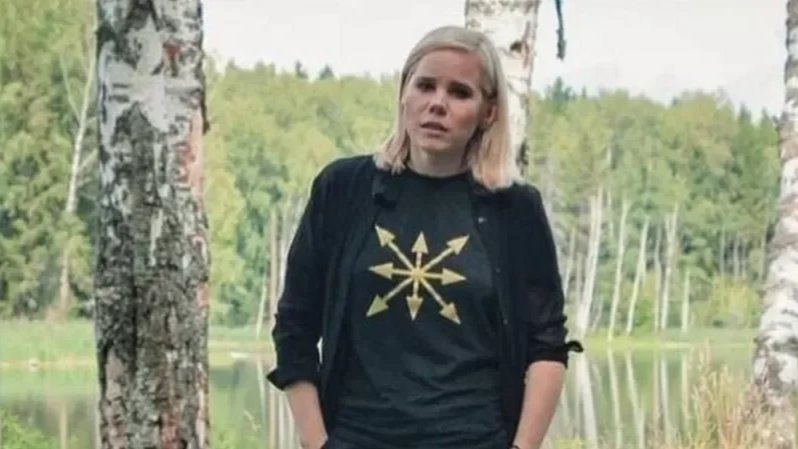On 20 August, Darya, daughter of philosopher Alexander Dugin, was killed in the suburbs of Moscow — her car was blown up on the way back from the Tradition festival. According to family friends, Dugin himself was also supposed to return in that car, but at the last moment he got into another vehicle. Both the philosopher and his daughter supported the war, some Western media even call him its ideologist. Novaya Gazeta. Europe talked to several political scientists about the Dugin family and tried to find out if they were really, as people claim, that influential in Russian politics.
On Saturday, the 60-year-old political philosopher Alexander Dugin and his youngest daughter Darya Dugina visited the Tradition festival in the estate Zakharovo in the Moscow suburbs. Dugin gave a lecture there. They planned to go back to Moscow in the same car, however, Dugin ended up leaving in another car. The Land Cruiser that Darya was driving exploded on the go and burst into flames. The woman died on the spot.
Sunday morning, Russia’s Investigative Committee said that Darya’s murder had been planned in advance, calling it a hitjob. The investigation concluded that the explosive device had been installed in the bottom of the car, under the driver’s seat.
Philosopher Alexander Dugin has been called both the ideologist of the war in Ukraine and of the “Russian world” concept and “Putin’s brains”. Some claim that his ideas were the basis for the current Russian ideology.
Dugin is famous, first of all, for his book The Fourth Political Theory, which has also been referred to as “foundation of Putinism”, even though Dugin had not met Putin at the time of the writing.
“He thinks that he synthesises different positions and points of view: doesn’t just take xenophobia and racism from the right and materialism and atheism from the left, instead taking social justice and cultural identity,” political scientist Nikolay Petrov explains. “Furthermore, his position towards authority dramatically changed over time — before Putin, he used to be a harsh critic of the regime, later on, he became more moderate and criticised the regime only for its slight missteps. But in general, he supported and welcomed [Putin’s politics].”
In 2004, Dugin founded the International Eurasian Movement. In February 2005, together with Ukrainian politicians Oleksiy Arestovych, Dmytro Korchynsky, and political scientist Valeriy Korovin, he announced the foundation of the Eurasian Anti-Orange Front to Russian state news agency RIA Novosti during a press conference. Also in 2005, as part of the International Eurasian Movement, he established the Eurasian Youth Union, which later saw participation of his youngest daughter Darya.
“Dugin is quite an educated person, he does write and read a lot, which differs him from the majority of propagandists he’s sometimes compared to,” Petrov continues. “His informal influence on many people, starting from rock musicians and ending with Selesnyov and Naryshkin (deceased Russian communist politician and Russia’s Director of the Foreign Intelligence Service respectively — translator’s note), is quite large.” In 2016, the philosopher became editor-in-chief of the propaganda TV channel Tsargrad. There, according to the political scientist, Dugin was able to share his views both directly and through the people under his influence, seeing as he is “one of the very few people able to formulate ideological and value-based constructs”.
However, a different political scientist Fyodor Krasheninnikov does not consider Dugin quite that influential. “The only people who could call Dugin an ideologist of Russian politics are people that don’t know anything about Russian politics or trust what Dugin writes about himself,” Fyodor explains. “He has never been influential enough to have connections in the Kremlin or with Putin. Dugin is just a very skilled, intelligent con man who knows how to promote himself very well. He became the spiritual leader of a small group of followers, who consider his pseudo philosophical nonsense to be something clever. Possibly, this group includes some servicemen and government officials, but it’s still not a mainstream ideology and definitely not the ideology of the Russian state. I actually think Putin has no base ideology at all. He has multiple different ideologies for various society segments. Dugin was one of the multiple information bubbles, but he has never been known to the residents of the other, bigger information bubbles.”

Alexander Dugin and his daughter Darya. Photo: From social media
‘Mouthpiece for Dugin’s ideas’
Darya Dugina was her father’s follower; she shared his views on Eurasianism and supported the invasion of Ukraine. Recently, she came back from the occupied regions of Ukraine where, among other places, she visited the Azovstal steelworks in the occupied Mariupol. She conducted news reports from Ukraine for political scientist Sergey Karnaukhov, who often appears on Vladimir Solovyev’s TV programme. At the beginning of July, Darya was included in the UK sanctions lists for “disinformation in relation to Ukraine and the Russian invasion of Ukraine on various online platforms”.
BBC Russian service correspondent Anastasia Lotareva notes that Darya worked as her father’s press secretary and “was in charge of all his affairs”. Dugina graduated from MSU Faculty of Philosophy and wrote journalistic materials for RT and Tsargrad under the pseudonym Darya Plotonova. She also participated in various political talk-shows as an expert.
According to political scientists, they found out about Darya Dugina yesterday, when they saw the news of her death. “She, of course, wasn’t a prominent figure in Russian politics. I don’t follow political talk-shows, but it turns out that she actively participated in them and served as a mouthpiece. Dugin also has a lot of connections among young people through the Eurasian Youth Union, and she, it seems to me, was exactly that young person who actively worked on spreading propaganda,” Nikolay Petrov says.
“Dugin, to be frank, is nothing, so his daughter definitely couldn’t have been a target of the assassination,” Fyodor Krasheninnikov speculates. He thinks that what happened to Dugina resembles “Putin’s favourite theory on sacrificial lamb”. “They picked a third-class propagandist, who liked saying he was close to Putin, [wanted to] to kill him, and then say that Russia’s damned enemies have started to basically blow up its patriots,” the political scientist explains his theory. “Dead Dugin could be way more useful than alive Dugin. But he survived, it looks like only by miracle, because he got into another car, so his daughter was killed instead. But from what I’m seeing in certain pro-government Telegram channels, they will turn his daughter into a sacrificial lamb too.”
Fyodor Krasheninnikov also thinks that neither Dugin nor his daughter could have been ideologists of the war in Ukraine. “Even if Dugin spent his entire life dreaming about war, it would have never started only because of his wishes, lectures, and articles. It’s just a bunch of words. The war was started by Putin and the military-political leadership of Russia. Propagandists don’t start wars, they’re just propagandists, their job is to promote the war. It doesn’t absolve them, but to seriously think that some marginal writer, known for spewing nonsense and nastiness, started this war is to fundamentally fail in understanding how Russian politics works.”
Join us in rebuilding Novaya Gazeta Europe
The Russian government has banned independent media. We were forced to leave our country in order to keep doing our job, telling our readers about what is going on Russia, Ukraine and Europe.
We will continue fighting against warfare and dictatorship. We believe that freedom of speech is the most efficient antidote against tyranny. Support us financially to help us fight for peace and freedom.
By clicking the Support button, you agree to the processing of your personal data.
To cancel a regular donation, please write to [email protected]

